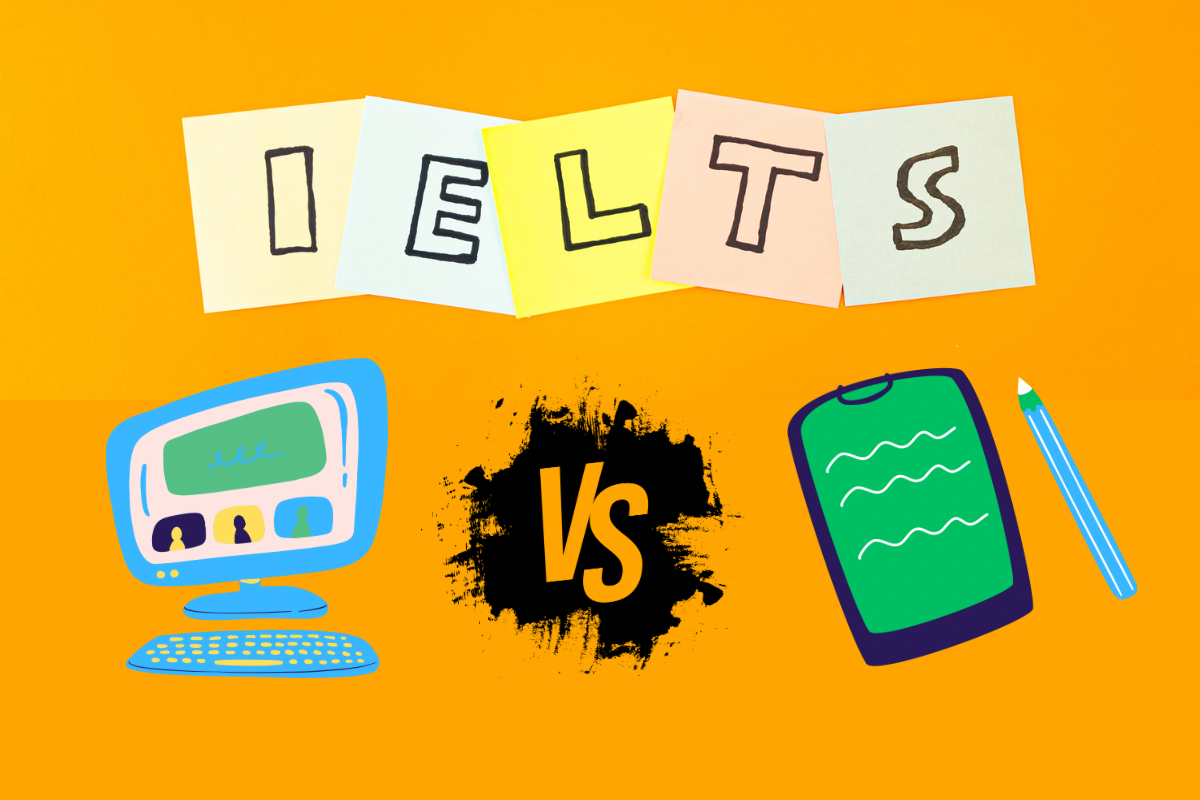This post is also available in:
Español
Dear students,
If you want to study or live in an English speaking country, you will need to take IELTS. The test format comes in two variations, and knowing how each test is conducted will help you achieve a good band score.
Receiving a high score on the IELTS test can open up many doors for you, whether it’s for furthering your studies, advancing your career, or relocating to another country. The IELTS test comes in two versions: the old-school paper test and the newer IELTS on computer.
In this blog, we’ll look at the differences between these two versions, their advantages, and help you pick the best one for your IELTS journey, especially if this is your first time taking the test. So, if you’ve been wondering if you should take the paper based or computer based test, keep reading.
By the end of this post you will clearly know the advantages of using a computer for the test or writing on paper to complete the IELTS benchmark for English skills.
IELTS on paper vs IELTS on Computer: Similarities between the two
Both versions, paper based and computer based, of the IELTS are very similar in terms of content, format, and scoring.
They include the same four sections:
- Listening Test
- Reading Test
- Writing Test
- Speaking Test
The Listening and Reading sections are the same for both versions, while the Writing and Speaking sections are slightly different.
Let’s outline the differences for each section which you can expect to see when you take IELTS on computer or IELTS paper based.
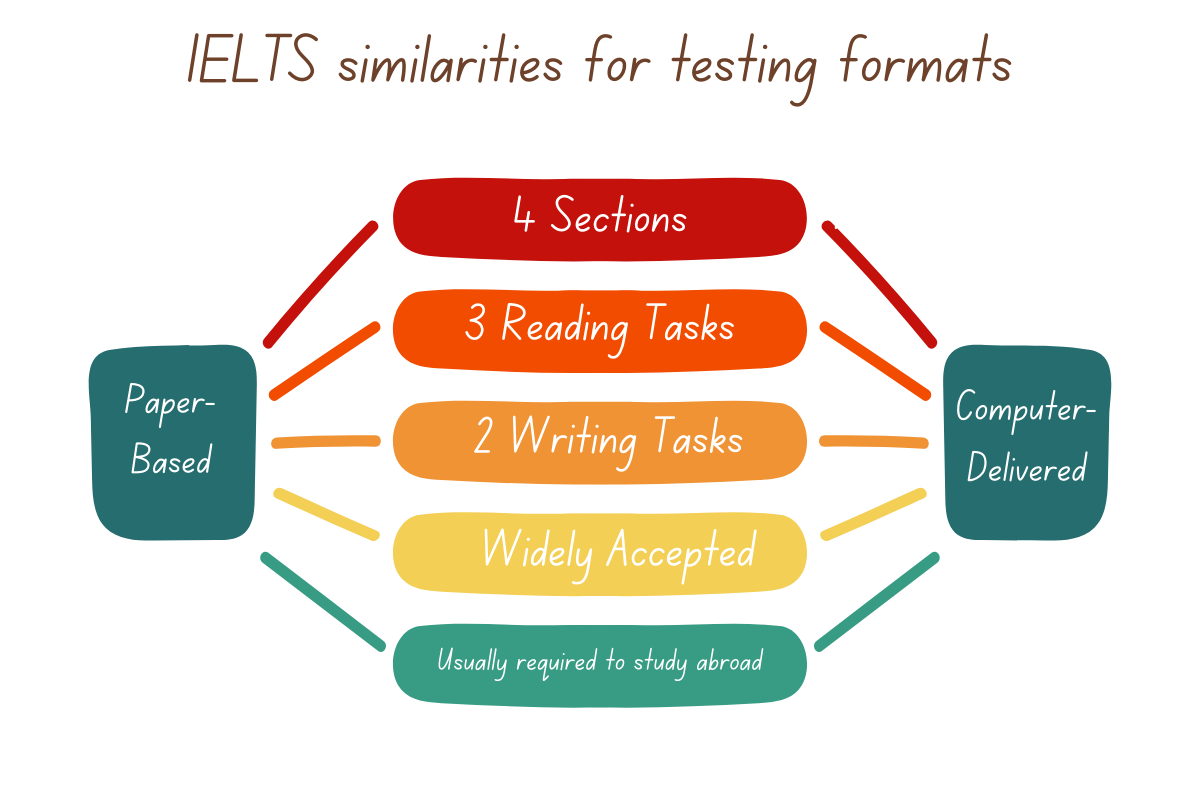
By the end of this post you will clearly know the advantages of using a computer for the test or writing on paper to complete the IELTS benchmark for English skills.
IELTS on paper vs IELTS on Computer: Similarities between the two
Both versions, paper based and computer based, of the IELTS are very similar in terms of content, format, and scoring.
They include the same four sections:
- Listening Test
- Reading Test
- Writing Test
- Speaking Test
The Listening and Reading sections are the same for both versions, while the Writing and Speaking sections are slightly different.
Let’s outline the differences for each section which you can expect to see when you take IELTS on computer or IELTS paper based.
IELTS Listening and Reading Test
The IELTS Listening and Reading sections are both divided into three parts, each with increasing difficulty. The Listening section consists of four recorded audio passages, while the Reading section consists of three long passages. You must answer a variety of questions about the passages, including multiple choice, true/false, and fill-in-the-blank questions.
IELTS Writing Test
The IELTS Writing section is different for the two versions of the exam. In the paper-based test, you need to write a report and an essay in response to two different prompts. In the online test, you must type a report and an essay in response to the same prompts.
The test is further differentiated between IELTS academic and IELTS general. in the former you will be required to analyze graphs and define trends, or outline a process using academic language, making this test most suitable for people entering university. In the latter you will be required to write about general topics.
IELTS Speaking Test
The Speaking test is the same for the two versions of the IELTS. If you opt to take IELTS on paper, the Speaking section is completed face-to-face with a trained ielts examiner. In the online test, the IELTS Speaking section of the test will be conducted face-to-face too. The best way for an examiner to understand your level of spoken English is with a live conversation which is why the speaking test will be conducted live in both version of the test.
Now that we know the similarities of these exams, most notably being that the question types will remain the same and that you will complete the speaking part face-to-face with an IELTS examiner, let’s see the differences in these exams so you can understand the advantages and disadvantages of the computer based test vs paper based.
IELTS Test Paper Based vs Computer Based
In this section of the article you will learn the differences between ielts test on paper and computer test. We wil talk about the execution of the ielts computer based test and contrast it with taking the test with pen and paper.
Please note that the test center you choose taking your test will have specific procedures, so there may be small differences on exam day specific to your circumstances. However, we have compiled the differences between the two exams so you can choose whether paper or computer testing will be better for you.
So, let’s get into it.
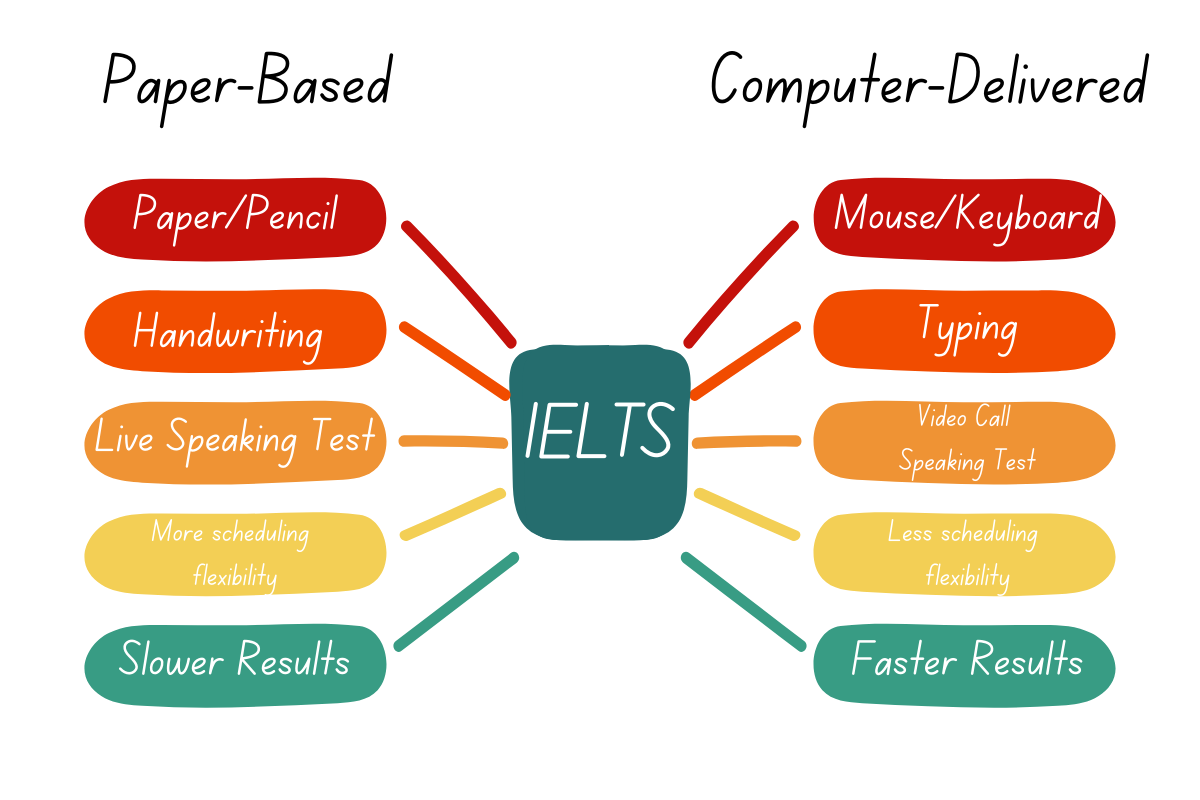
Computer Based vs Paper Based Delivery Method
Ielts writing paper based and computer based differences
IELTS speaking test on paper and computer
Test Scheduling and Flexibility
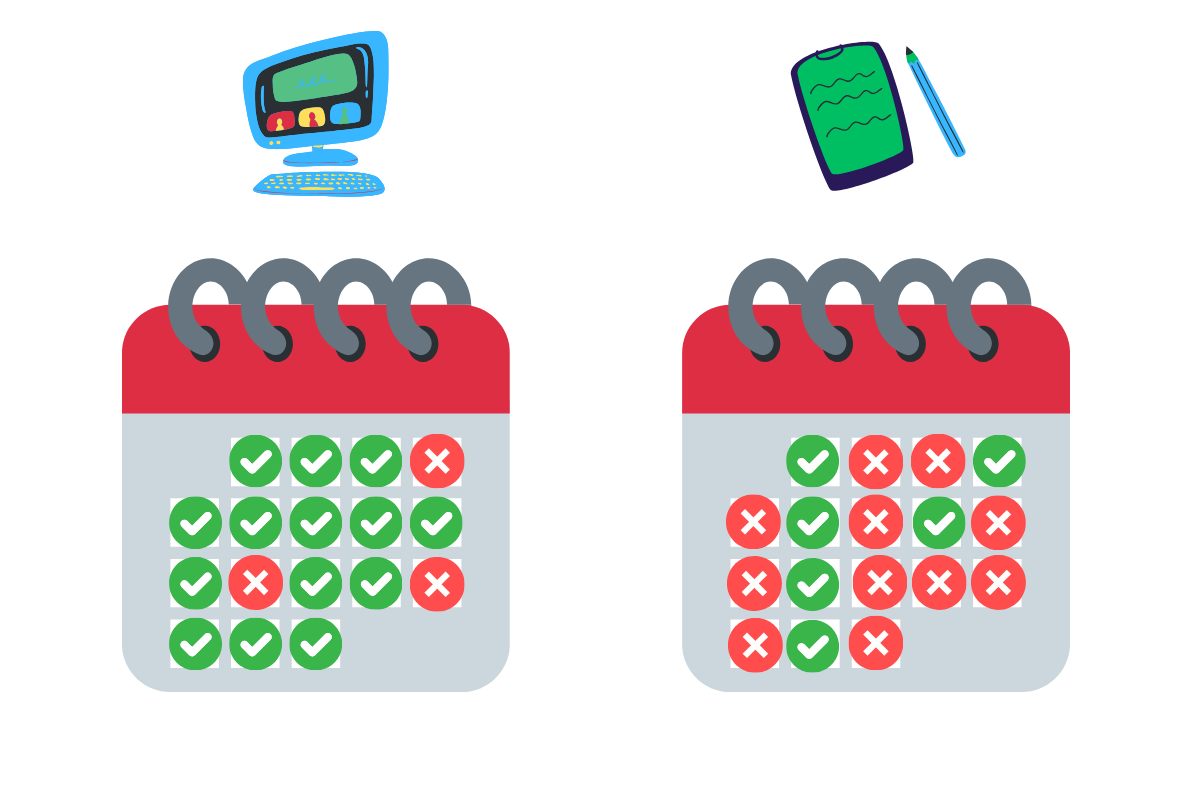
Take Ielts online to get your results faster
Volume Control in the Listening Module
Advantages of the written IELTS
Let’s talk about the advantages of each type of exam now, beginning with the written test.
Face-to-Face Speaking
Some learners prefer the face-to-face Speaking interview as it provides a more personal and real-life experience. It allows you to engage with the examiner directly.
No Computer Skills Required
If you are more comfortable with traditional pen-and-paper exams and don’t want to deal with a computer interface, the written exam is a straightforward choice.
Physical Study Material
Some students prefer physical study materials, which are readily available for the written version of the exam. You can mark, highlight, and annotate in your question booklet, which is not possible in the computer-based version.
Advantages of Computer-Based Online IELTS
Now, let’s look at the reasons why you may choose the computer delivered IELTS.
Faster Results
As mentioned earlier, if you take the test on computer, you typically receive your results within 3-5 days, while paper-based results may take up to two weeks. If you have time constraints, the computer delivered version is a better choice.
Flexible Scheduling
The computer-based online IELTS offers more flexibility in terms of test dates and times. This can be incredibly convenient for those with busy schedules or those who want to take the test on short notice.
Typing Skills
If you are more efficient with typing as compared to writing, the computer-based online IELTS allows you to type your written responses. This can be advantageous if you have good typing skills and prefer this over handwriting.
Listening Adjustments
In the online IELTS version, you can adjust the volume for the IELTS Listening module to your preference. This control can be helpful in ensuring you hear the audio clearly.
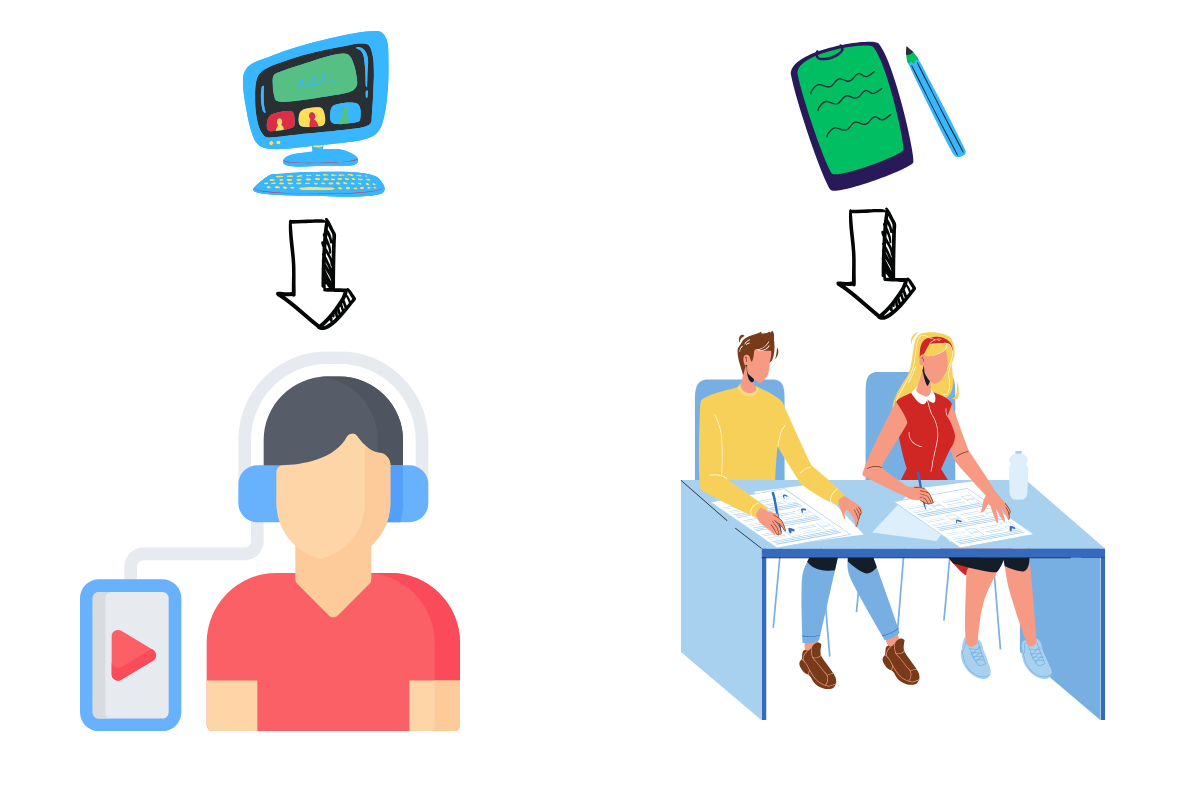
So, computer or paper? Which version of the IELTS exam should you take?
The choice between the computer-delivered IELTS and written exam depends on various factors, including your personal preferences and whether you prefer old school testing or modern computer type exams.
Here’s what to consider and how you should choose between ielts on paper and computer.
Application Deadlines
Choose a computer-based or online IELTS exam if you need faster results, especially if you have application deadlines to meet.
Your preference
Do you prefer to write by hand or to type? Do you prefer to take tests in a traditional classroom setting or on a computer?
Your comfort level with technology
If you are not comfortable with using computers, you may want to take the written exam.
Test Center availability
The online IELTS test is not available at all test centres. Make sure to check with your local test centre to see if the online test is available.
Which version of the IELTS exam would we recommend for someone who has never taken it before?
If you have never taken the IELTS exam before, we would recommend taking the written version. The paper-based test is a more traditional format that many people are more familiar with. It also gives test takers more time to transfer their answers to the Listening section.
However, if you are comfortable using computers and you are looking for a more convenient and flexible test option, then you may want to consider taking the online IELTS exam.
Will you take the computer based test or do you prefer writing on paper?
The choice between paper-based and computer-based IELTS ultimately depends on your individual circumstances and preferences. Both versions are equally valid and recognised, and your choice should align with your specific needs and time or comfort constraints.
Make sure to check the requirements of the institutions or authorities you’re applying to, consider your own comfort with technology, and weigh the advantages and disadvantages of each version.
Ultimately, the goal is to showcase your English language proficiency, and the IELTS exam is designed to help you do just that, regardless of the format you choose.
Are you looking for high quality IELTS preparation?
We know that taking the IELTS is your key to a brighter future, but you also need to secure an outstanding score. Although we do not offer IELTS live lessons as a main offer, we do have many recorded courses at cost-effective prices.
So, if you are looking to improve your scores in a self study environment, check out our recorded courses. or, if you want specific help with IELTS reading or writing strategies you can book a one-time consultation with one of our expert IELTS tutor’s will work with you to resolve any questions that remain about the test.
During your meeting you are not constrained to asking questions about only one section of the exam, you can ask anything about all sections of all IELTS tests, whether it be the academic or general exam.
Lastly, if you would like to receive exclusive offers regarding our recorded lessons or receive emails to help you success on the IELTS, join our email list by filling out the form below. As a bonus for joining we will send you a free reading strategies checklist for the IELTS exam.
